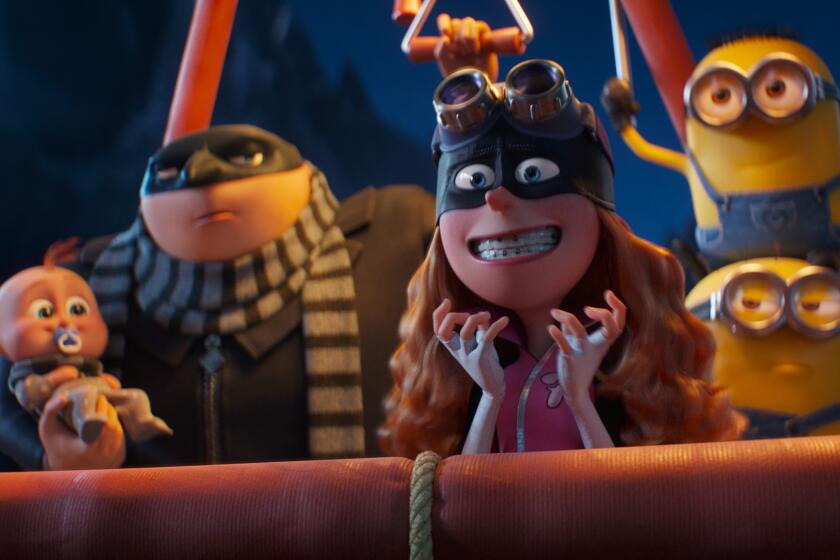VON TROTTA’S ‘MADNESS’ RESONATES WITH REALITY
The most impressive of the many accomplishments of West German film maker Margarethe von Trotta’s elegant and shattering “Sheer Madness” (Los Feliz, Monica 4-Plex) is that the inner lives of her people and the world in which they live are both so completely realized they can mirror one another in constant reverberation. Because of this, at any given moment we immediately understand why they react to this world and to one another as they do.
Von Trotta’s relentlessly contemporary milieu is that of creative, intellectual achievers who are 40ish, attractive and impeccable in their tastes. No wonder the darkly beautiful Ruth (Angela Winkler), emotionally unstable since the suicide of her brother 12 years before, has such a hard time keeping her bearings, surrounded as she is by successful, seemingly confident people. In her vulnerability and obvious intelligence, she elicits the concern of Olga (Hannah Schygulla), a professor of literature and a committed feminist who becomes determined to liberate Ruth soon after meeting her.
The flowering of the friendship between these two women is as tender and affecting as it is potentially dangerous, especially to Ruth. Yet how wonderful it is to see Ruth beginning to smile, commencing to forsake her meticulous black-and-white copies of the Old Masters for bold, Impressionist studies of the moon and the stars. It’s not so wonderful for Ruth’s seemingly compassionate and long-suffering husband Franz (Peter Striebeck) or for her brittle, autocratic mother (Agnes Fink) who haven’t acknowledged their deep need for Ruth’s dependence upon them. Franz’s gratitude to Olga for what she is doing for Ruth evaporates as his feeling of being threatened escalates. For all her brillance, courage and character, Olga is not fully aware of the consequences and ramifications of her admirable concern for Ruth, either to her new friend or to herself.
“Sheer Madness” is Von Trotta’s attempt to assess what’s going on right now in the lives of both women and men. She suggests that both sexes are thrashing about as they try to square their passion for independence and personal identity with their need for emotional support. Happily, none of Von Trotta’s sentiments emerge that didactically but rather in her characters’ behavior and through their interactions. Von Trotta reveals rather than judges.
How very perceptive Von Trotta is. Here’s the assured Olga, separated from her husband (Franz Buchreiser), a celebrated theater director with whom she remains good friends. She’s taken as a lover a somewhat exotic, pony-tailed Russian emigre concert pianist (Wladimir Yordanoff), his career in limbo and afflicted with a (surely symbolic) limp. Also living with her is her teen-age son (Felix Moeller), who has that disturbing knack of seeing through the subterfuges and evasions in the adults in his life.
“Sheer Madness” is just about flawless. Juergen Henze’s production design could not be more evocative, with Olga’s sunny apartment seeming as impersonal in its airy way as does Ruth’s home with its dark, spare chrome-leather-and-marble interiors. Michael Ballhaus’ clear, precise images set up a stark contrast between the bleak, austere West German city in which Ruth and Olga live and the the warm, busy streets of Cairo, where the two women go for a feminist seminar that Olga conducts with Ruth’s help.
Hannah Schygulla and Angela Winkler have long been among the finest actresses of the new German cinema, and here they are a glorious duo. With her long dark hair parted in the middle, Winkler’s Ruth, in her pathological shyness and her Victorian cameolike appearance, brings to mind a sturdy Emily Dickinson. With her steady gaze, warm strength and utter naturalness, Schygulla’s Ruth easily commands our respect--and gains our affection and concern as we discover that she, too, is vulnerable, just like the rest of us. Schygulla has never seemed so radiant as when she sings, in English and with a Dietrich-like huskiness, Carole King’s “Will You Still Love Me Tomorrow?”
With “Sheer Madness” (Times-rated: Mature) Von Trotta, director of the remarkable “Sisters, or the Balance of Happiness” and “Marianne and Julianne,” continues her exploration of friendship and sisterhood between women but with a greater concern for the men in their lives. Indeed, when “Sheer Madness” is over we realize that it is also about West Germany, even perhaps Western Civilization itself, facing an uncertain future within a fragile, destructive present.
More to Read
Only good movies
Get the Indie Focus newsletter, Mark Olsen's weekly guide to the world of cinema.
You may occasionally receive promotional content from the Los Angeles Times.






